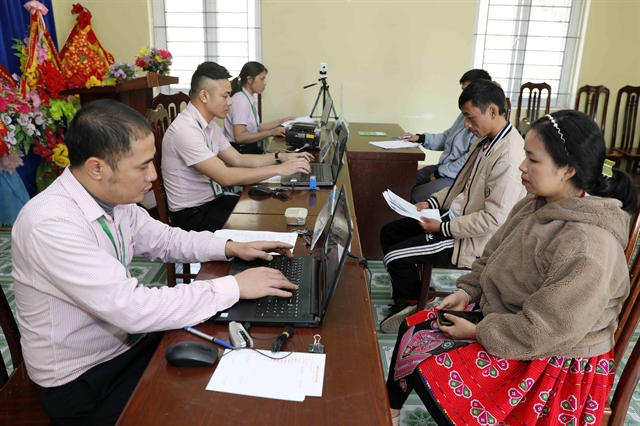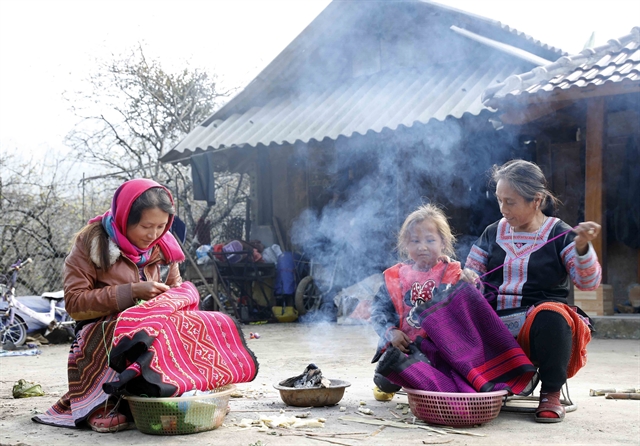 Society
Society


|
| Poor households are given loans with preferential interest rates for economic development in Hang Kia Commune, Mai Châu District in Hòa Bình Province. VNA/VNS Photos Trần Việt |
HÒA BÌNH – Hòa Bình always gives priority to sustainable poverty reduction, in which the province will focus on addressing multidimensional poverty and promoting sustainable poverty reduction in the coming time, Vice Chairman of the Provincial People's Committee Nguyễn Văn Toàn has said.
Toàn said Hòa Bình has implemented policies and investments in disadvantaged areas, especially those facing extreme difficulties, to encourage and improve the quality of basic social services. This aims to enhance accessibility for communities in disadvantaged areas. Policies on sustainable poverty reduction have been implemented to increase income and improve the quality of life for impoverished individuals.
Despite achieving encouraging results in multidimensional poverty reduction, Hòa Bình still has one district facing high levels of deficiency in basic social services, according to Toàn.
The majority of poor households belong to those who face serious health issues, and lack the ability to work, which poses challenges for reducing poverty in the coming years. Multidimensional poverty is still a significant challenge for the province.
Multidimensional poverty involves assessing real poverty by considering indicators such as access to essential services like healthcare, education and food, rather than solely relying on income measurements. The Multidimensional Poverty Index (MPI), developed by UNDP and OPHI, is measured on a scale of 0 to 10, with 10 indicating the highest levels of multidimensional poverty in countries.
Households with average incomes per person per month below VNĐ2 million (US$82.1) in urban areas and VNĐ1.5 million ($61.6) in rural areas, and lacking basic social services indicators, are considered poor, according to Đỗ Anh Chiến, Head of Social Protection Office under the provincial Department of Labour, Invalids and Social Affairs.
These indicators include employment, healthcare, education, housing, water supply, environmental sanitation, and information.
The assessment showed that many poor households in the province still live in difficult conditions with unmet minimum needs. In the villages of Pà Cò 1, Pà Cò Lớn, Pà Háng Lớn, Xà Lĩnh, and Cang in Pà Cò Commune in Mai Châu District, deficiencies in clean water supply persist.
Although there are eight water supply projects in the area, most of them are inactive due to ageing infrastructure and limited water sources.

|
| Ethnic minority women in Hang Kia Commune, Mai Châu District in Hòa Bình Province have been provided with loans to develop traditional handicrafts. This has improved their incomes during idle farming seasons. |
Sùng A Màng, Secretary of the Party Committee of Pà Cò Commune, said: "Many families in the commune still use natural water sources. In the dry season, they have to buy water."
In the neighbouring Hang Kia Commune, ensuring water sources for some households is also challenging. Two water supply plants in Thung Ẳng and Thung Mặn villages have deteriorated, and two other villages, Thung Mài and Pà Khôm, require construction investment.
Figures from the province showed that in 2022, the multidimensional poverty rate province-wide was 22.32 per cent, representing a 3.2 per cent reduction in overall poverty and a 0.62 per cent decrease in near-poverty compared to 2021.
The results regarding the deficiency in basic social services showed that there were over 18,800 households lacking employment opportunities. Additionally, there were 19,058 households lacking healthcare, including 16,608 households with no health insurance, and 2,450 households with malnourished children.
There were 4,130 households lacking education, 19,699 households lacking housing, 18,514 households lacking clean water and environmental sanitation, and 10,966 households lacking access to information.
Improving quality of life for the poor
Improving the quality of life for the poor is a key focus for Hòa Bình Province. According to Vice Chairman Toàn, the province recognises sustainable poverty reduction as a crucial and prioritised task.
Implementing policies and investments in disadvantaged areas is essential to encourage and enhance the provision of quality basic social services. The policies on sustainable poverty reduction such as supporting education fees, health insurance contributions, social credit, electricity expenses, housing and clean water must be enhanced.
The province also focuses on vocational education development, strengthening vocational training linked to employment, income enhancement, and improving quality of life for the poor, especially women and people with disabilities.
Toàn said the province would concentrate on addressing various deficiencies and promoting sustainable poverty reduction, increasing people’s awareness of multidimensional poverty reduction.
He encouraged the Government agencies, units and localities to regularly update credit policies for poverty reduction to ensure comprehensive coverage of policies and beneficiaries.
As one of the ten provinces with a high proportion of ethnic minorities, accounting for 74.43 per cent of the total, Hòa Bình prioritised ethnic policies to stabilise the population, address livelihoods, increase income and ensure social welfare for local people.
The province would continue concentrating on investing in people, directly improving the capabilities of the poor. It would identify the root causes of poverty to comprehensively address fundamental issues for the poor and impoverished core areas, he added. – VNS




